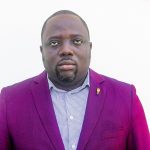Monrovia, Liberia – Prominent Liberian commentator Henry Pedro Costa has sparked national debate with his recent claims about a coordinated effort to unseat House Speaker J. Fonati Koffa. In a scathing Facebook podcast, Costa alleged that powerful political figures, including Vice President Jeremiah Koung and Representative Thomas Fallah, are involved in an underhanded plot to remove Koffa, driven by self-interest and corruption concerns.
“This fight to remove the Speaker is not about my water-seller in the Duala Market,” Costa said. “It is about them—a political cartel that would do anything to protect their interests, amassing wealth at the people’s expense through the national budget.” He contended that Speaker Koffa’s bold reform agenda, which includes an unprecedented attempt to audit the House of Representatives, triggered these efforts to oust him. “How dare he try to have an audit?” Costa said, implying that the audit would expose hidden corruption among legislators.
Costa highlighted the power dynamics in Liberia’s government, asserting that while the Speaker’s position is technically third in line, it wields far more influence than the vice presidency. “The vice president is a nominal role,” he explained, adding that Koffa’s commitment to reform has made him “the most powerful” target for those threatened by change. According to Costa, those behind the removal plot aim to preserve their own power and wealth, which they fear may be jeopardized by Koffa’s accountability push.
Costa specifically accused Vice President Koung of orchestrating the Speaker’s removal behind President Joseph Boakai’s back, stating, “While Fonati was with the President meeting Pope Francis, some of the President’s own people, including but not limited to Vice President Jeremiah Koung, were prosecuting a sinister plan to remove the Speaker.” Costa further emphasized that President Boakai did not support the plan, noting that the Vice President’s actions humiliated the President and potentially weakened the administration’s credibility.
Costa also criticized Representative Thomas Fallah, tracing his rise from modest beginnings to millionaire status, owning multiple properties, a university, and radio stations. “Thomas Fallah was in Red Light selling planks when CDC put him on their ticket,” Costa remarked, referencing Fallah’s early political career under the Congress for Democratic Change. “Today, he’s a multimillionaire, all thanks to his position and connections.” Fallah, Costa suggested, no longer feels indebted to former President George Weah, who supported his career, and has instead aligned with Vice President Koung’s camp in the move against Koffa.
In a call to action, Costa urged the public to protest against the attempted removal, warning, “On December 9th, don’t be surprised when you see a number of lawmakers sanctioned for corruption, bribery, and staging a coup against the first branch of government.” He hinted at potential U.S. sanctions against Liberian lawmakers engaged in “pay-to-play” schemes, emphasizing that those involved could soon face international scrutiny.
Vice President Jeremiah Koung’s silence on Speaker Koffa’s removal is intriguing, considering the numerous accusations that have lingered in the media since the debacle began weeks ago.
The crisis has placed Liberia’s bicameral legislature at a standstill. Without the House of Representatives, the Senate cannot function effectively, disrupting legislative processes at a critical time when President Boakai is preparing to submit the national budget. Costa underscored the urgency, stating, “By supporting an unconstitutional process, these lawmakers are sabotaging President Boakai’s government and the Liberian people’s business.”
Costa’s exposé has thrown a spotlight on Liberia’s governance challenges, exposing deep-seated issues within the political system. As allegations of corruption and abuse of power continue to emerge, many Liberians await decisive action to protect the integrity of the legislature and ensure transparency in government.
Liberian-born Emmanuel Orlind Cooper is an accomplished multimedia journalist with extensive experience covering news and stories on a variety of media platforms. Orlind's work frequently demonstrates his profound grasp of the region and its complexity, given his Liberian heritage.
Now residing in Woodbridge, Virginia, he keeps connecting with readers across continents with his perceptive journalism and sharing his viewpoint. He is well-respected in the sector because of his unwavering commitment to honesty and morality, which sets him apart in the field.
Orlind's work is more than simply his job; it's a dedication to giving voice to the voiceless, illuminating unsung tales, and advancing the worldwide conversation on important concerns. His goal as a journalist is to use the media's power to change the world, not just to disseminate information. He is a key player in modern journalism because of the inspiration, education, and engagement that his work consistently provides.


